Nestled in the heart of Bavaria lies a city that holds a secret of epic proportions – a secret that has shaped the very fabric of its existence. Munich, renowned for its rich history and cultural heritage, owes its fame and fortune to none other than beer.
Yes, you heard it right – beer! But this is not just any ordinary beer; it is a beverage that has traversed centuries, from the humble beginnings of monasteries to the grand celebration known as Oktoberfest.
So, how did this golden elixir become the lifeblood of Munich? Prepare to be captivated by the remarkable tale that unfolds, as we uncover the fascinating history of Munich’s beer and the traditions that have made it an integral part of the city’s identity.
Good To Know
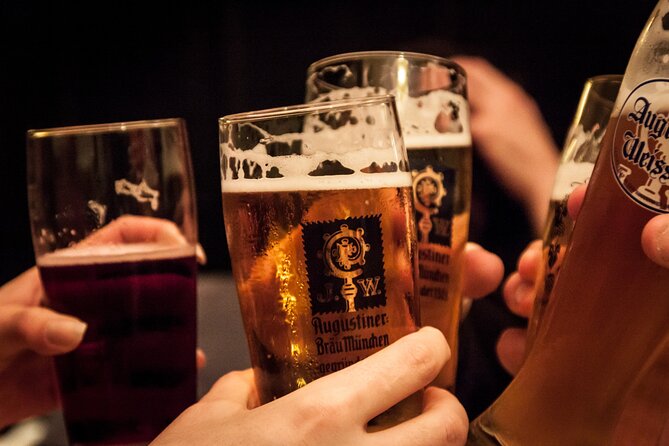
- Munich’s beer legacy can be traced back to the Middle Ages and is celebrated through its diverse range of historical beer styles.
- Monastic brewing played a significant role in Munich’s beer culture, with monks preserving recipes, establishing breweries, and boosting trade and commerce.
- The Reinheitsgebot (Beer Purity Law) and Oktoberfest have shaped Munich’s beer culture, ensuring quality and purity of beer and showcasing it on a global scale.
- Beer gardens are vibrant hubs of Bavarian culture, providing a gathering place for locals and visitors to enjoy traditional beer styles and foster a sense of community.
Munich’s Beer Legacy
Munich’s beer legacy is a testament to the city’s rich brewing traditions and its enduring love affair with the golden nectar. The art of brewing has been deeply ingrained in Munich’s culture for centuries, resulting in a diverse range of historical beer styles that have stood the test of time.
From the world-renowned Märzen to the refreshing Helles, each beer style tells a story of craftsmanship and innovation. The city’s beer legacy isn’t only about the final product, but also about the process and dedication that goes into brewing. Munich has been a hub of brewing excellence, with breweries dating back to the Middle Ages.
Today, visitors can still experience the art of brewing firsthand, as well as savor the historical beer styles that have shaped Munich’s beer culture.
Enjoying the local flavors? More Munich food experiences we've written about
The Influence of Monks
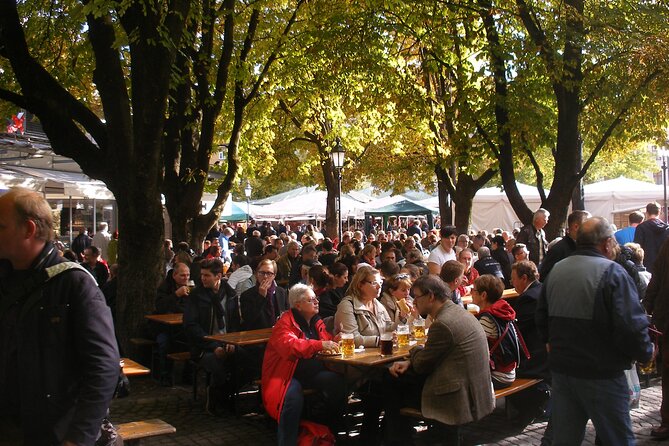
With their commitment to brewing excellence and their dedication to the art of beer-making, the influence of monks in Munich’s beer legacy cannot be underestimated. Monastic brewing played a crucial role in the development of Munich’s beer culture and had a significant impact on the local economy. The table below highlights some key aspects of the monks’ influence on Munich’s beer:
| Influence of Monastic Brewing | Impact on Local Economy |
|---|---|
| Pioneered brewing techniques | Boosted trade and commerce |
| Preserved and perfected recipes | Created jobs and employment opportunities |
| Established breweries and beer gardens | Attracted travelers and visitors |
The monks’ focus on quality and craftsmanship elevated Munich’s beer to new heights, making it renowned for its exceptional taste and brewing traditions. Their breweries became important centers of trade, contributing to the city’s economic growth. Plus, the hotel of beer gardens provided a social gathering place for locals and visitors alike, further stimulating the economy through increased tourism and hospitality. The monks’ influence on Munich’s beer legacy continues to be celebrated and cherished to this day.
From Reinheitsgebot to Oktoberfest
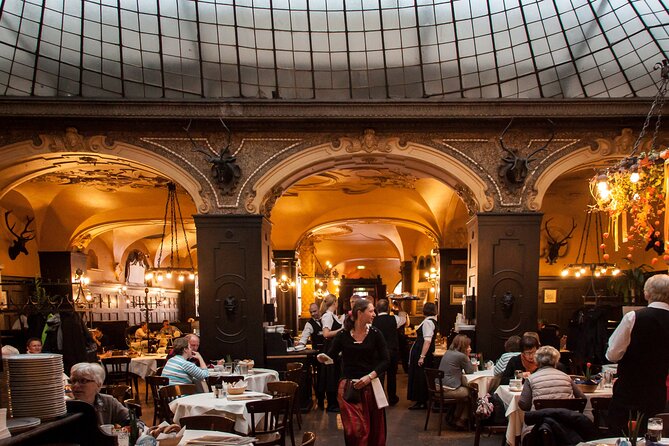
Reinheitsgebot, a historic beer purity law, and Oktoberfest, the world’s largest beer festival, are two iconic symbols of Munich’s rich brewing heritage. Here’s a closer look at how these two elements have shaped Munich’s beer culture over the years:
Reinheitsgebot and brewing history: The Reinheitsgebot, also known as the Beer Purity Law, was established in 1516 in Munich. It dictated that beer could only be brewed using barley, water, and hops, with yeast later being added to the list. This law ensured the quality and purity of Munich’s beer, laying the foundation for the city’s brewing tradition.
Oktoberfest and beer celebrations: Oktoberfest began in 1810 as a celebration of the Bavarian Crown Prince’s marriage. It has since evolved into a grand beer festival, attracting millions of visitors from around the world. Held annually in Munich, Oktoberfest showcases the city’s beer culture, with massive beer tents, traditional Bavarian music, and hearty food.
Together, Reinheitsgebot and Oktoberfest have played significant roles in shaping Munich’s beer culture, making it a paradise for beer enthusiasts and a must-visit destination for anyone looking to enjoy the world of Bavarian brewing.
Beer Gardens and Bavarian Culture
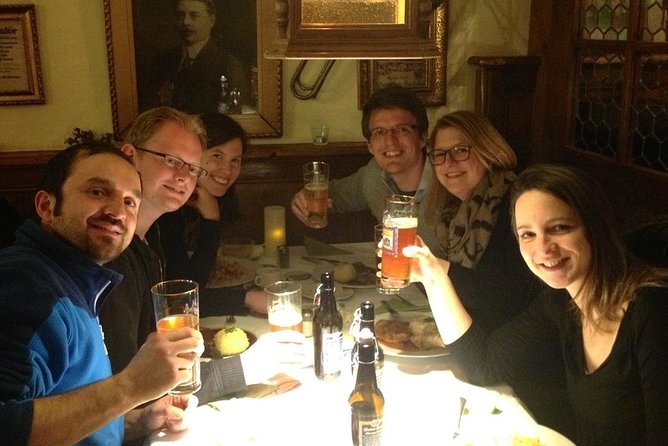
Nestled among the picturesque landscapes of Bavaria, beer gardens in Munich are more than just places to enjoy a cold brew – they are vibrant hubs of Bavarian culture and community. These outdoor spaces, with their long wooden tables, leafy trees, and lively atmosphere, provide the perfect setting for locals and visitors alike to gather and celebrate the rich traditions of Bavaria. Bavarian beer garden etiquette is an important aspect of the experience, with patrons encouraged to bring their own food or purchase it from the on-site vendors. Traditional beer styles such as Helles, Weissbier, and Dunkel are served in large steins, fostering a convivial atmosphere. It is common to see families, friends, and even pets enjoying the relaxed and welcoming ambiance of these beloved beer gardens, creating lasting memories and fostering a sense of community.
| Beer Garden Etiquette | Traditional Beer Styles |
|---|---|
| Bring your own food | Helles |
| Purchase from vendors | Weissbier |
| Family-friendly | Dunkel |
| Pet-friendly |
Brewing Techniques and Traditions
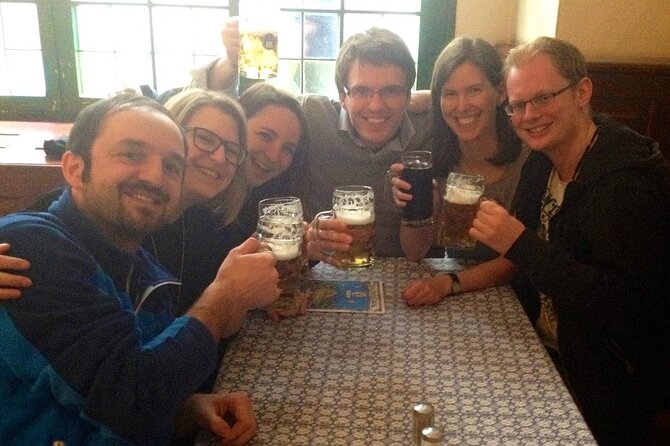
Munich’s brewing industry is steeped in rich traditions and techniques that have been passed down for centuries. Here are four key factors that differentiate craft brewing from commercial brewing and traditional brewing from modern brewing in Munich:
Craft vs Commercial: Craft breweries focus on small-batch production, using traditional methods and high-quality ingredients. Commercial breweries, on the other hand, prioritize mass production and often compromise on quality.
Traditional vs Modern: Traditional brewing techniques involve long fermentation periods, aging in wooden barrels, and the use of specific yeast strains. Modern brewing techniques utilize advanced technology, shorter fermentation times, and stainless steel tanks for efficiency.
Quality Ingredients: Munich’s breweries adhere to the Reinheitsgebot, or Beer Purity Law, which stipulates that beer can only be brewed using water, malt, hops, and yeast. Locally sourced ingredients are preferred, ensuring the highest quality and authentic flavor.
Attention to Detail: Munich brewers pay meticulous attention to every stage of the brewing process, from selecting the finest ingredients to maintaining precise temperature control during fermentation. This dedication to craftsmanship results in the exceptional taste and consistency that Munich beers are known for.
Interested in history? More Munich historical sites we've covered
- Culinary, History Salzburg Day Trip From Munich – Transport, Tastings Included
- Private Munich Old Town & Historical City Tour
- Munich: Friendly History for Family With Kids Guided Walking
- Munich: Private Exclusive History Tour With a Local Expert
- Munich: Private Walking Tour of the Historical City Center
- Bayern Munich Tour (City, Land, Bazaar, Historical, Taste)
Modern Craft Beer Scene
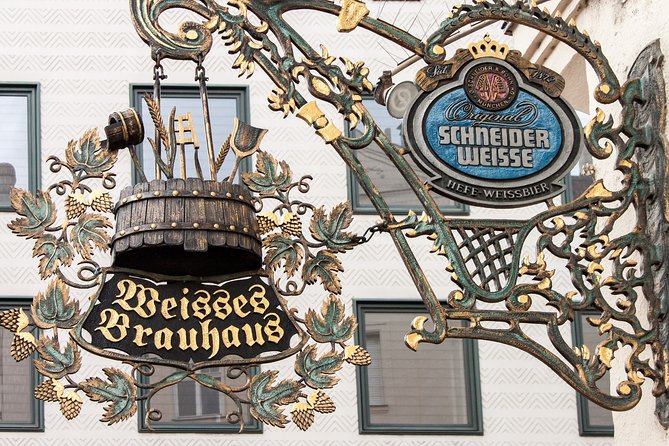
The craft beer scene in Munich has experienced a flourishing revival in recent years, captivating both locals and visitors with its innovative brews and vibrant atmosphere.
Microbreweries have sprung up throughout the city, offering a wide range of unique and flavorful beers. These small-scale breweries prioritize quality and craftsmanship, often experimenting with different ingredients and brewing techniques to create beers that push the boundaries of traditional styles.
Beer tasting has become a popular activity, allowing beer enthusiasts to sample a variety of Munich’s finest craft brews. From hop-forward IPAs to rich and malty stouts, there’s something to please every palate.
Whether you’re a seasoned beer connoisseur or simply curious about the craft beer movement, Munich’s modern beer scene offers a dynamic and exciting experience.
Common Questions
What Is the Cancellation Policy for the Guided Walking Tour of Old Town in Munich?
The cancellation policy for the guided walking tour of Old Town in Munich allows for a full refund if canceled at least 24 hours in advance. Cancellations made less than 24 hours before the start time are non-refundable.
What Is the Overall Rating of the Tour Based on Viator and Tripadvisor Reviews?
The overall rating of the tour, based on Viator and TripAdvisor reviews, is an impressive 5.0 stars. Customers have provided positive feedback, highlighting the detailed history of beer in Munich and the wealth of information provided.
How Much Does the Guided Walking Tour of Old Town in Munich Cost?
The guided walking tour of Old Town in Munich costs $165.89 and lasts for a duration which is not specified. It offers a captivating exploration of the city’s history, culture, and the integral role of beer.
Where Can I Find Assistance or Get Additional Information About the Tour?
For assistance or additional information about the tour, visitors can reach out to Viator’s Help Center. They offer various assistance options and can provide all the necessary tour information sources.
What Is the Product Code for the Guided Walking Tour of Old Town in Munich?
The product code for the guided walking tour of Old Town in Munich is 234621P3. The cancellation policy states that a full refund is available if canceled 24 hours in advance.
The Sum Up
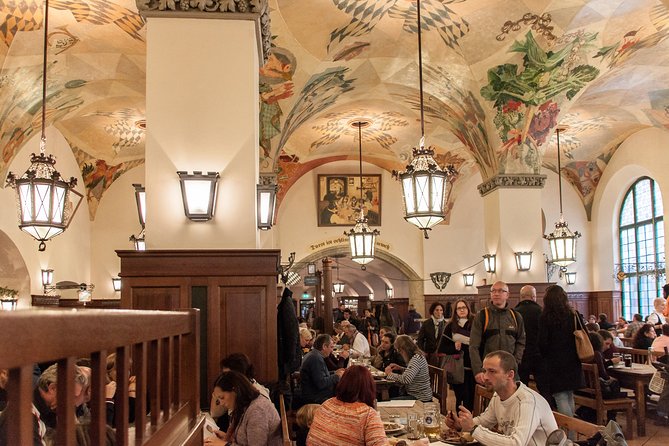
To sum it up, Munich’s beer has a rich and fascinating history that dates back to the days of monks and monasteries. From the Reinheitsgebot purity law to the world-famous Oktoberfest, beer has shaped the city’s culture, traditions, and identity.
Visitors can explore this captivating story through a guided walking tour of the Old Town, where they can learn about the brewing techniques, traditions, and even experience the taste of Munich beer firsthand.
Don’t miss the opportunity to uncover the secrets behind Munich’s enduring love affair with beer.
More Historical Tours in Munich
- Munich and Nazi History Combination Day Tour Small Group
- Munich: Guided Craft Beer & Cultural Tour With Snack
- Private Munich Old Town and Historical City Walking Tour
- Munich: Guided Tour of the historic Town Hall on Marienplatz
- Munich old town: culture, history and traditions
- Munich History and Architecture In-App Audio Walk (ENG)
More Food & Drink Tours in Munich
- Aschheim: Distillery Tour with Tasting and Buffet
- Munich and its beeran unforgettable beer tour with beer tasting
- Munich: Beer and Pub Tour with Tasting Portions
- Munich: 3-Hour Food Tour Through Schwabing in German
- Munich: Christmas Markets Food & Drink Tour
- Munich: Guided Private E-Bike Tour with Beer Garden Lunch
More Tour Reviews in Munich
Looking for something different? Other Munich activities we've written about
- 2 Hours Best of München Sightseeings Tour
- A Full-Day Walking Tour of Munich
- Art Nouveau Meets Street Art in Munich
- Aschheim: Distillery Tour with Tasting and Buffet
- Bavarian Bus Tours Sightseeing Munich with free drinks
- Comedy City Battle: München – Augsburg 12.09.2025
- Create Street Art in Munich’s Creative Soul
- Dachau Memorial Site Tour With Small Group
- Explore Nymphenburg Palace with an Architect & Guide
- From Munich: Private Day Trip to the Berchtesgaden Alps
- From Munich: Premium Neuschwanstein Castle & Linderhof Tour
- From Munich: Neuschwanstein & Linderhof Castle Full-Day Trip
